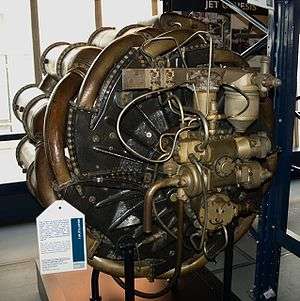
Power Jets
Power Jets Ltd was a British company set up by Frank Whittle for the purpose of designing and manufacturing jet engines. The company was nationalised in 1944, and evolved into the National Gas Turbine Establishment.
History
Founded on January 27, 1936, the company consisted of Whittle, Rolf Dudley-Williams, James Collingwood Tinling, and Lancelot Law Whyte of investment bankers O T Falk & Partners.
Initial premises were hired from British Thomson-Houston (BTH) at Rugby, Warwickshire. In addition to the founder members, the company initially 'borrowed' some fitters from BTH to assist in the project and later Power Jets was able to get 'one or two' people on loan from the Royal Air Force. By the beginning of 1940 the company had a total workforce of about twenty five. In 1938 Power Jets had moved from Rugby to BTH's works in Lutterworth.
A major breakthrough for the company came in 1940 when at the prompting of Stanley Hooker, Ernest Hives, chairman of Rolls-Royce, visited Lutterworth, and offered to make any parts Whittle required at Rolls-Royce's Derby experimental shop.
Power Jets WU
The Power Jets WU (Whittle Unit) was a series of three very different experimental jet engines produced and tested by Frank Whittle and his small team in the late 1930s.
Design and development
WU First Model was the very first jet engine to be built and run in the UK and possibly the world. Purely an experimental engine, the WU was not intended for flight so little attempt was made to save on weight. The straight through engine had four basic components: a single stage, double-sided, centrifugal compressor, a combustor with a single straight through chamber, a single stage, axial flow turbine and a convergent propelling nozzle attached to a jet pipe. The shaft connecting the turbine to the compressor was made as short as possible to avoid whirling. The combustion chamber was connected to the compressor outlet by a very large single spiral duct. Whittle had previously visited the British Industries Fair and on discussing his combustion chamber requirements with various exhibitors had been "practically laughed off every stand" until he discovered the firm of Laidlaw, Drew and Company, a firm prepared to tackle the difficult problem of combustion.
Podcasts:

